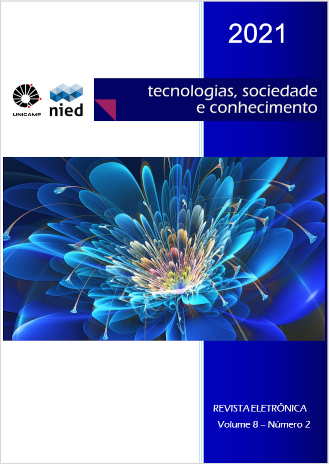Abstract
In this article, we discuss two possible futures for educational technologies and personalized learning. One is dominated by corporate products of programmed instruction in which “personalization” is strictly limited to the pace of consumption of the materials, with students unable to have any choice in terms of content or approaches. On the other end of the spectrum, maker education offers a different way to use technology, enabling students novel forms of expression and of agentic participation in today’s world. We conclude by warning about the appropriation of the discourse of progressive education by producers of systems of programmed instruction, and pointing out that there is, at the intersection of maker education and Freirean approches, a more promising future for educational technologies.
References
ALTSCHOOL. Learner-Centered Collaborative. 2022. Disponível em: www.altschool.com. Acesso em: 11 mar. 2022.
BLIKSTEIN, P. 2008. Travels in Troy with Freire: Technology as an Agent for Emancipation. In: NOGUERA, P.; TORRES, C. A. (Orgs). Social Justice Education for Teachers: Paulo Freire and the possible dream. Rotterdam, Netherlands: Sense, 2008, pp. 205-244.
BLIKSTEIN, P; Digital Fabrication and ’Making’ in Education: The Democratization of Invention. In: WALTER- HERRMANN, J.; BÜCHING, C. (Orgs). FabLabs: Of Machines, Makers and Inventors. Bielefeld, Germany: Transcript Publishers, 2013, pp. 203-221.
BLIKSTEIN, P.; BLIKSTEIN, I. Do Educational Technologies Have Politics? A Semiotic Analysis of the Discourse of Educational Technologies and Artificial Intelligence in Education. In: ITO, M; CROSS, R; DINAKAR, K; ODGERS, C. (Ed.). Algorithmic Rights and Protections for Children. 2021. DOI: https://doi.org/10.1162/ba67f642.646d0673
DEWEY, J. The school and society. Chicago: The University of Chicago Press, 1902.
DISESSA, A. A. Changing minds: computers, learning, and literacy. Cambridge, MA: MIT Press, 2000.
EISENBERG, M. Output Devices, Computation, and the Future of Mathematical Crafts. International Journal of Computers for Mathematical Learning. v. 7, n. 1, p. 1-43, 2002.
FERNANDEZ, C.; HOCHGREB-HAEGELE, T.; BLIKSTEIN, P. Toward a sustainable model for maker education in public education: teachers as co-designers in an implementation of educational makerspaces. In: FABLEARN: ANNUAL CONFERENCE ON MAKER EDUCATION, 9., 2020, New York. Proceedings… New York, USA: 2020. p. 46-53.
FREIRE, P. Pedagogia do oprimido. Rio de Janeiro: Paz e Terra, 1970.
FREIRE, P. Pedagogia da esperança: um reencontro com a Pedagogia do oprimido. São Paulo: Paz e Terra, 1992.
FUHRMANN, T.; FERNANDEZ, C.; HOCHGREB-HAEGELE, T; BLIKSTEIN, P. Professional development of science teachers in underserved communities: an initial report from the field. In: LONDON FESTIVAL OF LEARNING, INTERNATIONAL CONFERENCE OF THE LEARNING SCIENCES (ICLS), 13., 2018, London. Proceedings… London, United Kingdom: 2018. p. 1749-1750.
GERSHENFELD, N. Fab: the coming revolution on your desktop - from personal computers to personal fabrication. New York: Basic Books (AZ), 2007.
HALVERSON, E. R.; SHERIDAN, K. The maker movement in education. Harvard Educational Review. v. 84, n. 4, p. 495-504, 2014.
ILLICH, I. Deschooling society. New York: Harper & Row, 1970.
MARTINEZ, S. L.; STAGER, G. Invent to learn: Making, tinkering, and engineering in the classroom. Torrance, CA: Constructing Modern Knowledge Press, 2013.
MIKHAK, B. et al, Fab Lab: An Alternative Model of ICT for Development. “Development by Design” (dyd02). Bangalore: ThinkCycle, 2002.
PAPERT, S. Mindstorms: Children, computers and powerful ideas. New York, NY: Basic Books, 1980.
REICH, J. Failure to Disrupt: why technology alone can’t transform education. Cambridge: Harvard University Press, 2020.
RESNICK, M.; BERG, R.; EISENBERG, M. Beyond black boxes: Bringing transparency and aesthetics back to scientific investigation. Journal of the Learning Sciences, v. 9, n. 1, p. 7-30, 2000.
TERMAN, L. M. The measurement of intelligence. Boston: Houghton, Mifflin and Company, 1916. DOI: https://doi.org/10.1037/10014-000.
WATTERS, A. Teaching Machines: the history of personalized learning. Cambridge: The MIT Press, 2021
WILENSKY, U.; PAPERT, S. Restructurations: reformulating knowledge disciplines through new representational forms. In: CLAYSON, J. E.; KALAS, I., Constructionism. France: Paris, 2010.

This work is licensed under a Creative Commons Attribution 4.0 International License.
Copyright (c) 2022 Tecnologias, Sociedade e Conhecimento


